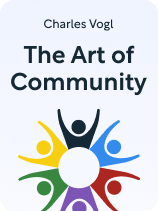

This article is an excerpt from the Shortform book guide to "The Art of Community" by Charles Vogl. Shortform has the world's best summaries and analyses of books you should be reading.
Like this article? Sign up for a free trial here.
Is your community ready for new members? How can you help new members feel like they belong?
In The Art of Community, Charles Vogl explains that when communities truly believe in their moral code, they’ll want to open their group to all who could benefit from joining it. However, communities should have barriers to admittance that separate people by moral codes.
Let’s take a closer look at how to successfully complete the induction of new members, based on how much their beliefs overlap with your community’s.
Incorporating New Members
Vogl explains that many communities believe exclusivity when conducting induction of new members is unfriendly or unfair, but he argues that barriers to admittance help community members feel safe: When the barriers are maintained, the community knows it won’t be infiltrated by people who don’t share their moral code and who would judge or even sabotage them because of their choices and beliefs. Without barriers to admittance, trust and connection eventually erode, which may cause members to become disillusioned and leave.
(Shortform note: In The Art of Gathering, Parker agrees with Vogl that exclusivity helps you protect your group from people who disagree with your beliefs and who might sabotage or distract your group from its purpose. For this reason, Parker views the decision not to invite non-members to group activities as an act of compassion toward members of your group. There may be reason to believe this is compassionate toward non-members, too: Psychologists explain that we have an inherent tendency to treat members of the groups we belong to better than non-members, no matter the circumstances. If you invited non-members to join community events, you might treat them poorly without meaning to—so it’s better not to invite them at all.)
Helping New Members Join
To help would-be members cross barriers to admittance, Vogl recommends incorporating a trial phase. During the trial phase, you allow would-be members to participate in community activities without making a full commitment to the community’s moral code. For online communities, Vogl recommends asking prospective members to explain why they want to join and answer questions about what they think of the community’s purpose and expectations. Having a trial phase enables newbies to learn more about the moral code and see if the community is a good fit for them, in the same way you’d try on a pair of shoes before buying them.
(Shortform note: Experts on community relations have advice for newbies in the trial phase of joining a community. They recommend showing up regularly to community events to establish yourself as a familiar face—this helps other members become comfortable with you and helps you feel like you belong. Experts also recommend being proactive about getting to know other members of the community—if you simply fade into the background or expect others to take charge of getting to know you, it decreases your chances of forming meaningful connections. One way to be proactive about getting to know your community is to introduce yourself to someone new at each event you attend.)
However, Vogl writes, it’s important to maintain some division between committed members and trial members—otherwise, committed members may worry about being judged or sabotaged by newbies. To maintain this division, he recommends reserving the most special or complicated activities for committed members only. He also says that some kinds of information shouldn’t be shared with trial members—this includes sensitive information about community operations as well as certain perspectives that can only be developed over time by participating in the community. For example, new converts to Buddhism probably aren’t ready for more advanced spiritual insights.
(Shortform note: Vogl intends for this method to be protective, but cults and other destructive communities sometimes use it nefariously—instead of inundating newcomers with virulent ideas, they slowly ingratiate newcomers without giving them the full picture of the community. For example, white supremacist groups have been known to lure new recruits by sharing less abrasive ideas and activities (like video game trash talk) that are easy to buy into and then gradually introducing them to more toxic ideas. Another example is the Mormon community’s tendency to put “milk before meat,” as explained by some ex-Mormons—that is, to share only the most agreeable tenets of the faith until the newcomer is committed to joining the community.)
Helping New Members Belong
When a would-be member finishes their trial phase and is certain they want to join the community, Vogl recommends incorporating a clear induction custom (Vogl calls this the Initiation Principle). The induction custom can be formal, like a ceremony, or informal, like a simple acknowledgment from a senior member that the new member is welcome (this is especially useful in online communities). Incorporating a clear induction custom helps new members feel like they’re a valid part of the community—without one, new members might be left wondering whether they’re truly accepted and valued by the community.
(Shortform note: Some communities, like the US military and college fraternities, have a history of incorporating toxic behaviors like hazing (which involves humiliating and abusive activities) into their induction customs. Experts explain that in these cases, induction customs can be traumatic, dangerous, and even criminal. As an alternative, they recommend incorporating healthier activities like community service into your induction customs. There are a wealth of positive induction customs out there that you might take inspiration from—for example, some cultures have induction customs that welcome girls to womanhood after they get their first period, which can involve eating special foods and wearing special clothing.)
To ensure new members feel welcome, continually reinforce a sense of belonging by asking them to be part of community activities. Vogl notes that even established members sometimes struggle to feel secure in their belonging, and he writes that you should also ask them to participate with the community. Doing so not only helps others feel welcome, but it also reinforces your own sense of belonging—you wouldn’t have the authority to ask if you weren’t a valid member of the community.
(Shortform note: Psychologists explain that both new members and long-term members of a community can struggle to feel secure in their belonging—this phenomenon is called imposter syndrome. Imposter syndrome is often accompanied by the feeling that you’re a fraud, as if you’re only pretending to be the kind of person your community would accept and that you’ll eventually be “found out.” To cope with imposter syndrome, experts recommend talking to mentors within your community who can support and reassure you. They also recommend you celebrate your strengths and successes, and even that you mentor others (this drives home the fact that you’re a valuable member of your community).)

———End of Preview———
Like what you just read? Read the rest of the world's best book summary and analysis of Charles Vogl's "The Art of Community" at Shortform.
Here's what you'll find in our full The Art of Community summary:
- The fundamental guidelines all communities should follow
- How to institute a community meeting place and set of customs
- How you can enhance belonging within your community






